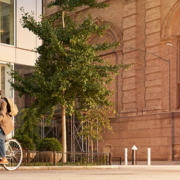JLL Cautions CBDs in Asia Pacific Must Reinvent Themselves to Stay Relevant Post-pandemic

Asia Pacific’s central business districts (CBDs) will increasingly need to be reinvented as multi-purpose destinations that cater to shifting demands for office space, greater variables in commuting and travel patterns, and a desire for “experience-based” spaces. This is according to new research on the future of CBDs by global real estate advisor JLL.
Return to office rates are over 70% in Asia Pacific – higher than many parts of Europe and the US – with re-entry rates at pre-pandemic levels in Shanghai, Beijing and Seoul, says JLL. However, a longer-than-expected return to pre-pandemic levels of transit usage and footfall will push CBDs and support real estate and infrastructure to go beyond acting primarily as places of work.
JLL analysis points to value-creation opportunities in Asia Pacific CBDs. They hold immense capacity for change due to their infrastructure, accessibility and stock of underused real estate – all of which underscore their resilience. However, with office vacancy at 14.7% in Asia Pacific, as well as the emergence of vibrant mixed-use neighbourhoods in the region’s largest cities which are attracting a growing share of businesses, residents and investment, there is further impetus for CBDs to reinvent themselves to remain relevant.
“How people perceive and use CBDs has shifted dramatically in the past three years due to the pandemic. To be future-proof, cities in Asia Pacific will need to find ways to reimagine the traditional core area to attract visitors, businesses and investment. For the future CBD to thrive as a mixed-use destination, investors and occupiers will need data-based advice and insights to collaborate strategically and make smart decisions,” said Anthony Couse, Chief Executive Officer, JLL Asia Pacific.
To take advantage of long-term real-estate opportunities, CBDs in Asia Pacific will need a balanced mix of uses, with improved amenities and investment in sustainable design. According to JLL analysis, refurbishing existing buildings is more sustainable than developing new buildings, as renovations can come with carbon impacts of less than 500kg of CO2 per square metre – well below that of new developments, which can be up to three times greater.
According to the JLL report, reinventing CBDs requires partnerships between the private sector and governments. Investors can employ a strategic, long-term mindset toward repositioning and diversifying their portfolios to cater to shifting preferences and reduce exposure to external shocks. Developers should proactively consider locations based on the potential for future growth and proximity to demand, the quality and age of buildings, and the ability to meet regulatory requirements regarding energy efficiency and sustainability.
Finally, governments must anticipate demand changes and provide greater flexibility to developers and investors, including through expanding tax credits to offset the cost of conversion and streamlining the planning process to reduce the lead time for delivery of new products. Notable examples of the private sector and governmental partnerships helping to reinvent CBDs include Singapore’s CBD Incentive Scheme, which provides developers with 25% to 30% increases in developable areas on assets at least 20 years old when converted from office to mixed-use. Likewise, Melbourne’s West Side Place district, which includes pedestrian areas lined with retail and green spaces to break up office-dominated “superblocks” of core business districts, has been successful in attracting footfall and investment.
“Any reinvention of Asia Pacific’s CBDs requires a long-term commitment of investors and developers, plus consistent governmental support. The office will remain core, but for a CBD to genuinely thrive, greater support of leisure and green spaces is a necessity to ensure continued relevance,” said Roddy Allan, Chief Research Officer, JLL Asia Pacific.











